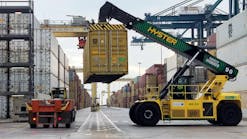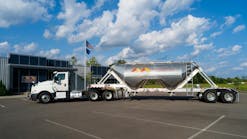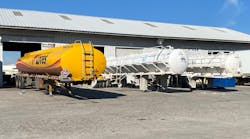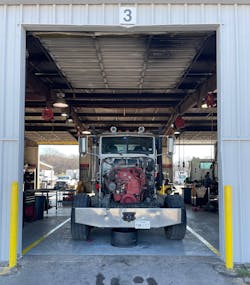Pressure nothing new for Texas tractor-trailer servicer, but solutions are
The business of tractor and trailer service has not changed significantly over the years, but the pressure applied to already challenging areas has, according to Troy Willich, CEO and a co-founder of Fort Worth, Texas-based TDI Fleet Services.
TDI Fleet Services operates an eleven-bay shop in downtown Fort Worth and a fleet of mobile maintenance vehicles for on-site service and repairs as well as emergency roadside assistance. Its regularly scheduled maintenance services can include utilizing a daily dedicated TDI Technician. All of its shop personnel are trained in the latest diagnostics tools and processes and on everything from preventive maintenance to a range of repairs and complete rebuilds for trucks and trailers. TDI Fleet Services also offers fleets PM tracking and online real-time expense budgeting services, as well as priority service and turnaround times. TDI can also send its technicians to fleet facilities if extra help is needed.
With all of those maintenance offerings, employees must build competence in far more than changing brakes out and performing oil changes, which has never been easy. Now, recent external factors have added additional burdens.
“It’s always been hard to find technicians who are skilled beyond just the basics,” Willich explained. “Today, with the growing shortage of help, technicians are in the driver’s seat. Now, we have entry-level techs demanding journeyman wages, so it’s even harder to compete.”
According to Bureau of Labor Statistics data from 2019, the diesel technician sector would need to hire 24,500 new techs every year over the next 10 years to replace its aging workforce. That was prior to the COVID-19 pandemic that disrupted the entire labor market as a whole. Last year, employees started to quit at a higher rate as well, a nationwide labor trend dubbed “The Great Resignation.”
Willich does not believe higher entry-level wages will alleviate the hiring challenges for service providers such as TDI.
“Once you go down that road, it’s hard to go back,” Willich added. “The people we’ve passed on hiring go to larger operations that can absorb the higher cost of wages, benefits, and training.”
There is also more pressure from customers to limit downtime for service and repairs as much as possible.
“Due to supply chain issues and a lack of spare trucks or trailers, fleets want to operate as close as possible to 100% utilization,” Willich said. “Currently, that can also be a challenge because of parts supply problems. We’ve been fortunate to be able to keep our shop supplied with everyday parts for things like lights and brakes, but other items have been harder to find.”
TDI considers its suppliers critical to achieve success during this chaotic time. “We partner with vendors who offer quality products, know the importance of delivery time, and provide us with the best pricing,” Willich said.
Along with well-honed partnership, communication with both new and established suppliers help ensure shop needs are met. “Sometimes you have to be the squeaky wheel so you get greased first, so to speak,” Willich said. “But a process of striving to make sure you’re communicating effectively has made us better.
Honesty and transparency are essential as well, Willich added. As a result, TDI Fleet Services is constantly providing service updates and time estimates based on diagnostics, shop throughput and work volume, parts availability, and changing customer expectations.
TDI is also using relationships with manufacturers to keep its shop staff up to date on their latest products and technologies. “The industry continues to see major changes in equipment designs, special features, and new regulation requirements,” Willich stated. “Keeping trucks and trailers maintained takes highly skilled technicians.”
Using data to track technician efficiency
Behind the scenes, initiatives that help limit downtime for TDI customers include using Fullbay heavy-duty repair shop software. Beyond reducing administrative tasks by automating and streamlining processes, the system’s data analytics and reporting capabilities are valuable as well, Willich noted.
For example, TDI uses its repair shop software to facilitate the use of KPIs (key performance indicators). One main metric it follows is technician hours compared to invoiced hours. “We measure efficiency so if a technician is billing fewer than 80% of the hours they are on the clock, it triggers our supervisors to look into the reasons,” Willich related.
“We follow parts metrics as well,” Willich continued. “Those tell us if our margins are down, or if a vendor is taking longer to make a delivery, which slows down shop throughput. The constant evaluation also helps us grade the performance of our suppliers.”
This allows TDI to identify the root causes of good and bad performances. “If we can fix problems or establish best practices, we can focus on other important challenges.” Willich stated.











